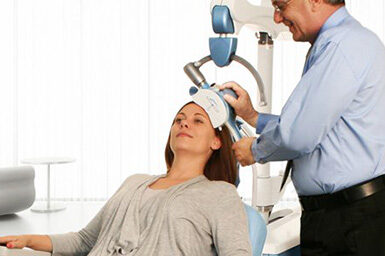Home » Does TMS Really Work in Depression?
Does TMS Really Work in Depression?

November 1, 2018
From The Carlat Psychiatry Report
Michael Posternak, MD
Dr. Posternak has disclosed that he has no relevant financial or other interests in any commercial companies pertaining to this educational activity.
Review of: Yesavage et al, JAMA Psychiatry 2018;75(9):884–893
Type of study: Randomized, sham-controlled trial
Repetitive transcranial magnetic stimulation (rTMS) has been FDA-approved for treatment-resistant depression (TRD) since 2008. This non-invasive therapy uses an electromagnetic coil to stimulate electrical activity in the frontal cortex. The present study tested its efficacy in a VA population of TRD patients with complex comorbidities.
This was a double-blind, sham-controlled, randomized trial conducted across 9 VA medical centers. In total, 164 subjects were enrolled; the average age was 55, and 81% were men. Treatment resistance was defined as 2 or more failed adequate antidepressant trials. Subjects had high rates of comorbidity, including PTSD (49%), medical comorbidity (49%), and a history of substance abuse (54%). Most were poorly functioning: Only 24% were working, and only 38% were married.
rTMS and sham rTMS were delivered for up to 30 sessions. Both groups came for treatment 5 days a week. Importantly, the sessions included supportive elements such as daily queries of mood and medication adherence and weekly screening for substance use. The primary outcome was remission of depression (≤ 10 on the Hamilton Depression Rating Scale).
rTMS displayed no advantage over sham treatment on the primary measure. Specifically, 41% achieved remission with active treatment, compared to 37% with sham treatment (p = .67). A sub-analysis suggested that rTMS might be more effective for depressed patients without comorbid PTSD (49% vs 43% remission rates), though this difference did not reach statistical significance either (p = .09). rTMS was very well-tolerated.
TCPR’s Take
Does this mean rTMS does not work? Not exactly, but it offered little benefit in this population of predominantly low-functioning men with complex comorbidities in the VA system. Remission rates were unusually high in both groups, and the fact that 40% recovered with the sham speaks to the therapeutic value of behavioral activation, structure, and social interaction in overcoming even the most seemingly refractory depressions. When all the studies are considered, ECT is more effective than rTMS and should be first-line when depression has not responded to traditional pharmacotherapy (Chen JJ, Behav Brain Res 2017;320:30–36).
General PsychiatryType of study: Randomized, sham-controlled trial
Repetitive transcranial magnetic stimulation (rTMS) has been FDA-approved for treatment-resistant depression (TRD) since 2008. This non-invasive therapy uses an electromagnetic coil to stimulate electrical activity in the frontal cortex. The present study tested its efficacy in a VA population of TRD patients with complex comorbidities.
This was a double-blind, sham-controlled, randomized trial conducted across 9 VA medical centers. In total, 164 subjects were enrolled; the average age was 55, and 81% were men. Treatment resistance was defined as 2 or more failed adequate antidepressant trials. Subjects had high rates of comorbidity, including PTSD (49%), medical comorbidity (49%), and a history of substance abuse (54%). Most were poorly functioning: Only 24% were working, and only 38% were married.
rTMS and sham rTMS were delivered for up to 30 sessions. Both groups came for treatment 5 days a week. Importantly, the sessions included supportive elements such as daily queries of mood and medication adherence and weekly screening for substance use. The primary outcome was remission of depression (≤ 10 on the Hamilton Depression Rating Scale).
rTMS displayed no advantage over sham treatment on the primary measure. Specifically, 41% achieved remission with active treatment, compared to 37% with sham treatment (p = .67). A sub-analysis suggested that rTMS might be more effective for depressed patients without comorbid PTSD (49% vs 43% remission rates), though this difference did not reach statistical significance either (p = .09). rTMS was very well-tolerated.
TCPR’s Take
Does this mean rTMS does not work? Not exactly, but it offered little benefit in this population of predominantly low-functioning men with complex comorbidities in the VA system. Remission rates were unusually high in both groups, and the fact that 40% recovered with the sham speaks to the therapeutic value of behavioral activation, structure, and social interaction in overcoming even the most seemingly refractory depressions. When all the studies are considered, ECT is more effective than rTMS and should be first-line when depression has not responded to traditional pharmacotherapy (Chen JJ, Behav Brain Res 2017;320:30–36).
Issue Date: November 1, 2018
Table Of Contents
Recommended
Newsletters
Please see our Terms and Conditions, Privacy Policy, Subscription Agreement, Use of Cookies, and Hardware/Software Requirements to view our website.
© 2025 Carlat Publishing, LLC and Affiliates, All Rights Reserved.


_-The-Breakthrough-Antipsychotic-That-Could-Change-Everything.jpg?1729528747)



